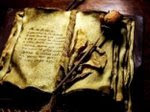WRITTEN BY Andrew Combs
PERFORMED BY Andrew Combs
APPEARS ON Tennessee Time (2010)
Exile and longing comprise one of country music's most enduring themes. While its Biblical roots resonate with the rural Christianity that formed country's original fan base, its popularity as a theme likely stems from the origins of radio and the diaspora of rural Americans that began with the Industrial Revolution and accelerated through the Great Depression and World War II. The Dust Bowl, the military draft, and the migration to high paying urban manufacturing jobs must have created a profound sense of dislocation for the young men and families suddenly far removed from everything they knew. Songs celebrating the simple, lost joys of rural life emerged, and, dispersed across radio waves, soon formed a vital part of the country music canon.
Newcomer Andrew Combs captures this sense of longing and belonging in "Tennessee Time," a sensation amplified in the wonderful video below. The first time I heard "Tennessee Time," I immediately thought that it would make a great front porch song. The notion wasn't original; as it turned out, Combs thought so, too (see the wonderfully sweet video below). In "Tennessee Time" the singer has returned home from a European tour that took him from Spain to Ireland, only to discover that "there ain’t nothing better/Than the Tennessee life."
Which is fine with him: The song is all about creating epiphanies that allow him to be "stuck in the moment of Tennessee time." Thus in the first verse, he gathers southern icons like sweet tea and a rocking chair, and repairs to the porch to sing "old country songs to the passerby." It's a moment where fast songs and sad lyrics make sense in the ineffable ambience of a Tennessee porch, and where a spiritual connection occurs in the "summers near the Cumberland Gap...stuck in a moment of Tennessee time."
Combs, who sounds like a fusion of Slaid Cleaves and Gram Parsons, names Guy Clark, Willie Nelson, Townes Van Zandt, and Hank Williams as influences. Estimable mentors all, but the trick lies in finding his own voice via the path they lay. He's off to an impressive start.
LYRICS
I bought myself a little old rocking chair
Got a cup of sweet tea, gonna sit right here
Singing old country songs to the passerby
Just stuck in the moment of Tennessee time
Spring brings green and a love so sweet
My heart tends to flutter and skip a beat
Me and my baby, we’re out of our minds
Stuck in the moment of Tennessee time
Chorus
I’ve been known to roam
I’ve been to Spain
I’ve been out in the Galway rain
I’ve come so close
To what I thought was right
But there ain’t nothing better
Than the Tennessee life
I play a little guitar in a rock n’ roll band
We sing sad songs and play as fast as we can
The drums are loud and the words don’t rhyme
But we’re keeping good rhythm to the Tennessee time
Now I spend my summers near the Cumberland Gap
I sleep outside, with the grass at my back
Just roll cigarettes, drink whiskey from rye
Still stuck in the moment of Tennessee Time






